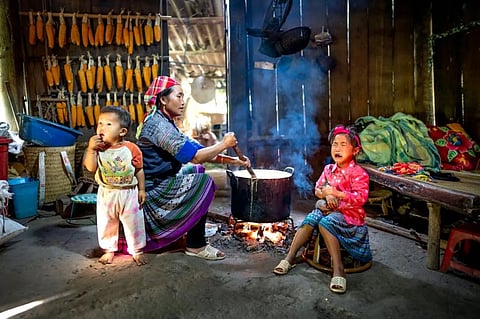

Climate change, a global phenomenon, has given rise to multiple challenges across the globe. From rising sea levels to an increase in the number of extreme weather events, the issues have been discussed across geopolitical spectrums.
One factor which has received little attention is the climate-linked nutrition affecting children in India. A report by the World Health Organisation (WHO) has highlighted the need to ensure a climate-resilient nutrition system.
With cases of stunting and wasting among children under the age of 5 years being high and around 57 per cent of women of reproductive age suffering from anaemia, the lack of nutrition and impact of climate change deserve more attention.
Regional disparities, climate vulnerability, food insecurity and health systems gaps prevailing in the country add more challenges in overcoming this crisis.
Lack of policy frameworks
According to the WHO report, in the southeast Asian region, only 2 per cent of climate policies address nutrition, while 95 per cent of nutrition plans lack climate considerations.
As far as the global scenario on funding for nutrition-related climate projects, 1 per cent of the total international funds are allocated for the projects.
With the climate changes throwing up new challenges, the lack of training for health and nutrition workers hampers the intention to ensure nutrition for children and adequate awareness.
Link between climate and nutrition
India faces a triple challenge in malnutrition, namely undernutrition, micronutrient deficiency and obesity. These challenges are further intensified by climate change-related happenings.
Dr Kiran Madhala, secretary general of Telangana Teaching Government Doctors Association (TTGDA), said, “The crop losses due to extreme weather events, including heatwaves, droughts and floods, reduce the agricultural productivity, affecting food availability and price. The climate-induced food insecurity increases the prevalence of stunting, wasting, anaemia and non-communicable diseases.”
Around 35.5 per cent of the children under the age of 5 in the country are stunted, while 19.3 per cent are wasted. Anaemia is also highly prevalent among women of reproductive age.
Consequences of lack of nutrition
The lack of nutrition can result in physical, emotional and cognitive effects among children.
Dr B Satyanarayana Reddy, consultant, paediatric intensivist and paediatrician at Rainbow Children’s Hospital, Hyderabad, said, “Lack of sufficient nutrition can lead to stunted growth, weakened immune system, fatigue and lethargy and poor wound healing.”
Brain development would be affected, resulting in low IQ, behavioural problems like attention deficit hyperactive disorder (ADHD), and emotional difficulties including anxiety, depression and mood swings, coupled with poor academic performance.
Long-term impacts on vulnerable populations
The lack of nutrition can have a long-lasting effect on children, including economic and social implications.
“Lack of nutrition can increase the risk of developing chronic diseases, such as diabetes, heart disease and certain cancers. Also, it affects reproductive health, including delayed puberty, infertility and poor pregnancy outcomes,” Dr Satyanarayana said.
Young children under the age of 5, pregnant and lactating women, and children with chronic illnesses are more vulnerable to the effects of a lack of nutrition.
Steps to overcoming the challenges
With several schemes implemented by the respective governments to ensure that nutrition is ensured for children, more intervention is required to totally eradicate the problem.
Schemes such as the National Adaptation Plan on Climate Change and Human Health, the National Mission for Sustainable Agriculture, and the Millet Mission have been introduced in India.
“We have to align nutrition, agriculture and health with climate resilience goals. There should be a real-time data platform for climate-sensitive health risks. Public distribution systems should be strengthened to ensure nutritious food reaches people in rural areas,” Dr Kiran Madhala said.
Key issues, like poverty, food insecurity and access to healthcare, should also be addressed with a primary focus.